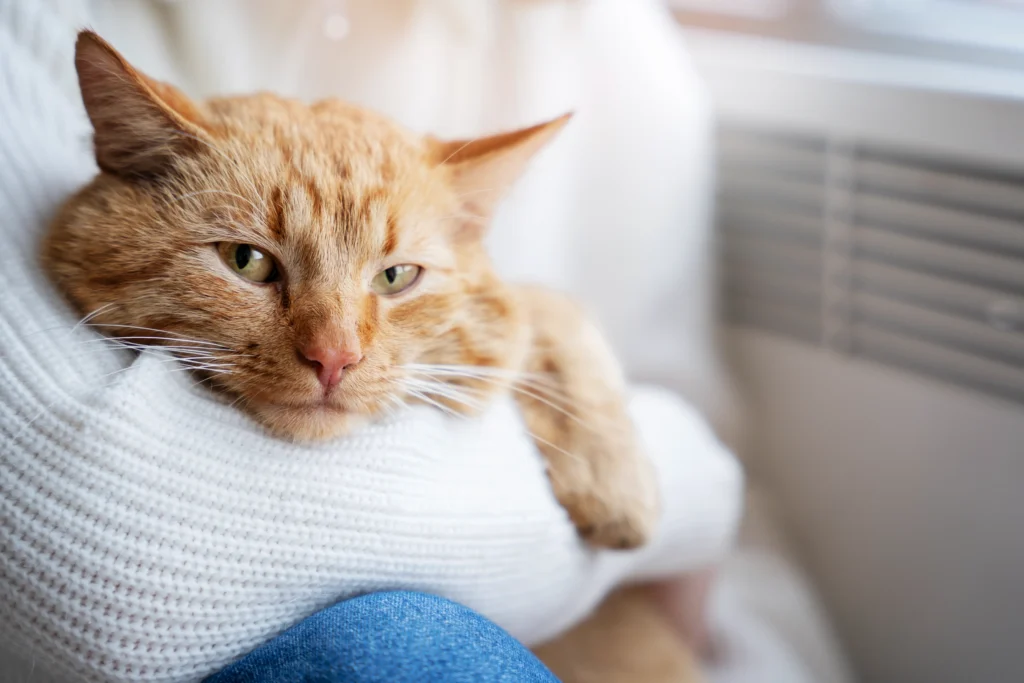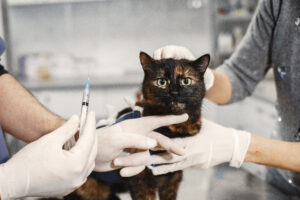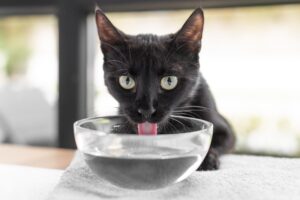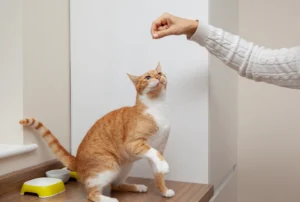Introduction: Understanding Cat Coughing
If you’ve ever been startled awake by the sound of your cat coughing in the middle of the night, you’re not alone. Cat coughing is a common concern among pet parents, and while occasional coughing might be normal, persistent or severe cat coughing can signal something more serious. As loving pet owners, it’s essential to understand when your cat’s cough requires medical attention and when it might be something more benign.
Cat coughing can manifest in various ways – from a dry, hacking cough to a more productive cough that may result in your cat coughing up foam or mucus. Some cats experience occasional coughing fits, while others might develop chronic coughing that persists over time. Whether your cat is coughing and sneezing, or your cat keeps coughing without producing hairballs, understanding the underlying causes can help you provide the best care for your feline friend.
In this comprehensive guide, we’ll explore why your cat might be coughing, how to identify different types of cat coughing, the potential causes behind a cat coughing a lot, and most importantly, the five warning signs that indicate your cat’s cough could be something serious requiring immediate veterinary attention.

Why Is My Cat Coughing? Common Causes Explained
When your cat starts coughing, it’s natural to wonder, “Why is my cat coughing?” Cat coughing serves as a protective reflex designed to clear the airways of irritants, foreign bodies, or excess mucus. Understanding the causes of cat coughing can help you address the issue appropriately.
Hairballs: The Most Common Cause
Often, what appears to be cat coughing is actually your cat attempting to expel a hairball. Cats are meticulous groomers, and during the grooming process, they inevitably ingest hair. Most of this hair passes through the digestive system, but some accumulates in the stomach, forming hairballs that the cat needs to cough up.
However, there’s a distinct difference between cat coughing vs hairball expulsion. When your cat is working on a hairball, the posture is typically more hunched, with the neck extended and a series of productive retches that eventually lead to expelling the hairball. If you notice your cat coughing but no hairball is produced after repeated episodes, this could indicate another underlying issue. For more information about hairball management, check out our guide on effective hairball remedies for cats.
Respiratory Infections
Upper respiratory infections are another common cause of cat coughing, often accompanied by other symptoms like cat coughing and sneezing, watery eyes, and nasal discharge. These infections can be viral or bacterial in nature and are especially common in:
- Kittens
- Cats from shelters
- Multi-cat households
- Outdoor cats exposed to other felines
When cat coughing and sneezing occur together, it’s often indicative of an upper respiratory infection that may require veterinary treatment, especially if symptoms persist for more than a few days. Learn more about recognizing the signs of cat respiratory infections on our dedicated page.
Asthma and Allergic Bronchitis
Feline asthma affects approximately 1-5% of cats and can cause significant respiratory distress. Cat asthma symptoms include:
- Persistent coughing or wheezing
- Difficulty breathing
- Open-mouth breathing
- Rapid breathing
- Blue gums (in severe cases)
A cat coughing and wheezing might be experiencing an asthma attack, which can be triggered by allergens like pollen, dust, cigarette smoke, or certain cat litters. If you notice your cat making coughing sounds combined with wheezing, especially after exposure to potential allergens, it’s important to consult with your veterinarian promptly. Discover more about managing feline asthma and creating an asthma-friendly home environment.
Foreign Bodies
Cats are curious creatures and may inadvertently inhale or ingest small objects like grass awns, small toys, or plant materials. These foreign bodies can become lodged in the throat or airways, causing a cat hacking cough that persists until the object is removed. In these cases, your cat may experience severe coughing fits as the body attempts to expel the obstruction.
Heartworm Disease
Although less common in cats than in dogs, heartworm disease can cause significant respiratory issues, including chronic coughing in cats. Even a few heartworms can cause serious damage to a cat’s lungs, leading to a condition known as Heartworm Associated Respiratory Disease (HARD). Cats with heartworm disease may exhibit:
- Persistent cat coughing, especially cat coughing at night
- Vomiting
- Lethargy
- Difficulty breathing
- Weight loss
To understand more about protecting your cat from this dangerous parasite, visit our detailed guide on heartworm prevention for cats.
Lung Parasites
Various parasites can affect a cat’s respiratory system, leading to coughing. Lungworms, for instance, are parasites that infect the airways and cause significant irritation. Cats typically contract lungworms by ingesting infected prey or through contact with contaminated water. Symptoms may include:
- Cat coughing fits
- Difficulty breathing
- Lethargy
- Weight loss
Heart Disease
Heart conditions, particularly those affecting the left side of the heart, can cause fluid buildup in the lungs (pulmonary edema), resulting in coughing. If your cat coughing a lot also appears lethargic, has decreased appetite, or seems to tire easily, heart disease could be a potential cause. Learn more about feline heart conditions and how to recognize early warning signs.
5 Warning Signs That Your Cat’s Cough Could Be Serious
While occasional coughing in cats might not be cause for immediate concern, there are certain warning signs that indicate a more serious condition requiring prompt veterinary attention. Here are five key indicators that your cat’s cough requires medical evaluation:

1. Persistent or Worsening Cat Coughing
If your cat keeps coughing for more than two days, or if the frequency and intensity of coughing increase over time, this is a clear warning sign. Chronic coughing in cats rarely resolves without proper treatment and can indicate underlying conditions like asthma, heartworm disease, or respiratory infections.
When to worry: If your cat has been coughing consistently for more than 48 hours or if the cat coughing fits are becoming more frequent or severe. See our article on when to seek emergency care for your cat for more guidance.
2. Cat Coughing Up Foam, Blood, or Mucus
When your cat is coughing up foam, yellow or green mucus, or any trace of blood, this indicates inflammation or infection in the respiratory tract. Cat coughing up mucus often signals a respiratory infection, while blood in the cough can indicate more serious conditions like pulmonary edema, trauma, or cancer.
When to worry: Any instance of cat coughing up foam with discoloration or blood requires immediate veterinary attention.
3. Difficulty Breathing Along with Coughing
If your cat’s coughing is accompanied by labored breathing, open-mouth breathing, or blue-tinged gums, this is a medical emergency. These symptoms could indicate severe asthma, heart failure, or a serious respiratory obstruction.
When to worry: If your cat is showing any signs of respiratory distress along with coughing, seek emergency veterinary care immediately. Learn how to recognize signs of respiratory distress in cats to be better prepared.
4. Cat Coughing Accompanied by Significant Behavioral Changes

Lethargy, loss of appetite, weight loss, or hiding behavior in combination with coughing can indicate a systemic illness affecting your cat’s overall health. When a cat coughing a lot also shows these behavioral changes, it suggests that the underlying cause is significantly impacting their well-being.
When to worry: If your cat’s normal behavior or routine has changed dramatically in conjunction with coughing episodes. Our guide on detecting behavioral changes in cats can help you identify subtle signs of illness.
5. Cat Coughing at Night or Triggered by Specific Activities

If your cat’s coughing predominantly occurs at night or is triggered by specific activities like play or exercise, this could indicate conditions like asthma or heart disease. Cat coughing at night can be particularly concerning as it may indicate fluid accumulation in the lungs that worsens when your cat is lying down.
When to worry: When coughing consistently disrupts your cat’s sleep or when normal activities consistently trigger coughing episodes.
How to Identify Different Types of Cat Coughing
Recognizing the characteristics of your cat’s cough can provide valuable information to help identify the underlying cause. Here’s how to differentiate between various types of cat coughing:
Cat Dry Cough
A cat dry cough sounds harsh and unproductive, similar to a person clearing their throat. This type of cough is often associated with:
- Throat irritation
- Early respiratory infections
- Asthma
- Kennel cough (Bordetella infection)
For more information about different types of coughs in cats, visit our cat cough identification guide.
Cat Coughing and Gagging
When cat coughing and gagging occur together, it can indicate:
- Hairballs trying to come up
- Foreign body obstruction
- Throat inflammation
- Tonsillitis
The distinction between cat coughing and gagging versus normal hairball behavior is important. True gagging often involves abdominal contractions and extension of the neck, while typical coughing doesn’t have the same abdominal involvement.
Cat Hacking Cough
A cat hacking cough is more forceful and prolonged, often occurring in episodes or fits. This type of cough might indicate:
- Chronic bronchitis
- Asthma
- Heartworm disease
- Advanced respiratory infections
Cat Making Coughing Sound Without Actual Coughing
Sometimes cats make sounds that resemble coughing but are actually:
- Reverse sneezing (rapid inhalation causing snorting sounds)
- Hiccups
- Throat clearing
These sounds can be confused with coughing but often have different underlying causes. Recording the sound for your veterinarian can help with diagnosis. Learn more about unusual cat sounds and what they mean on our detailed guide.
Cat Cough Home Remedies: When Are They Appropriate?
While serious causes of cat coughing require veterinary treatment, some mild cases may benefit from home care under veterinary guidance. Here are some cat cough home remedies that might provide relief for minor issues:
Hairball Management
If your cat’s coughing is related to hairballs, these approaches may help:
- Regular grooming to reduce ingested hair
- Specialized hairball diets
- Hairball remedies or lubricants (consult with your veterinarian first)
- Increased water intake to improve digestion
For more comprehensive hairball management strategies, visit our complete guide to hairball prevention.
Humidification for Dry Coughs
For cat dry cough caused by minor irritation:
- Run a humidifier in areas where your cat spends time
- Allow your cat in the bathroom during a steamy shower (not in the shower itself)
- Ensure adequate hydration
Reducing Environmental Irritants
For cats with sensitive airways:
- Switch to low-dust, unscented cat litter
- Use HEPA air purifiers
- Avoid air fresheners, candles, and strong cleaning products
- Create a smoke-free environment
Discover more about creating a respiratory-friendly home for cats with our comprehensive guide.
When Home Remedies Aren’t Enough
While these cat cough home remedies might provide temporary relief, they should never replace professional veterinary care, especially when:
- Coughing persists for more than two days
- Your cat shows any of the five warning signs mentioned earlier
- The cat coughing a lot despite home interventions
- Your cat appears to be in distress
Veterinary Diagnosis and Treatment for Cat Coughing
When you take your coughing cat to the veterinarian, the diagnostic process typically involves:
Initial Examination
Your veterinarian will perform a thorough physical examination and gather information about:
- When the coughing started
- The frequency and pattern of coughing
- Associated symptoms
- Environmental factors
- Your cat’s medical history
Our article on preparing for a veterinary visit can help you prepare effectively.
Diagnostic Testing
Depending on their initial findings, your veterinarian may recommend:
- Blood tests to check for infections or heartworm disease
- Chest X-rays to visualize the lungs and heart
- Bronchoscopy to examine the airways directly
- CT scans for more detailed images
- Airway washes to collect samples for analysis
Learn more about common diagnostic tests for cats and what to expect during these procedures.
Treatment Options
Treatment for cat coughing varies based on the underlying cause:
For Respiratory Infections:
- Antibiotics for bacterial infections
- Supportive care for viral infections
- Anti-inflammatory medications to reduce airway inflammation
For Asthma and Allergic Bronchitis:
- Corticosteroids to reduce inflammation
- Bronchodilators to open airways
- Environmental management to reduce triggers
For detailed information about asthma treatments, check out our comprehensive guide to feline asthma treatment options.
For Heartworm Disease:
- Supportive care to manage symptoms
- Medications to reduce inflammation
- Heartworm preventatives to prevent further infection
For Foreign Bodies:
- Endoscopic or surgical removal
- Antibiotics if infection is present
- Pain management as needed
Long-Term Management
For chronic conditions like asthma, long-term management may include:
- Regular medication administration
- Environmental modifications
- Periodic monitoring with your veterinarian
- Weight management (obesity can worsen respiratory conditions)
Our guide on managing chronic conditions in cats provides valuable insights for pet parents dealing with ongoing health issues.
Prevention: Reducing the Risk of Serious Cat Coughing Issues
While not all causes of cat coughing can be prevented, you can take steps to reduce the risk of serious respiratory problems:
Regular Veterinary Care
Routine check-ups can catch potential issues before they become serious. Annual or bi-annual examinations are recommended for most cats, with more frequent visits for cats with known respiratory conditions. Learn more about preventative veterinary care on our dedicated page.
Parasite Prevention
Year-round heartworm and parasite prevention can protect your cat from preventable causes of coughing. Follow your veterinarian’s recommendations for appropriate preventative medications. Our complete guide to feline parasite prevention offers detailed information about keeping your cat protected.
Vaccination
Keeping your cat up-to-date on vaccinations helps prevent infectious respiratory diseases like:
- Feline herpesvirus
- Calicivirus
- Bordetella
Visit our cat vaccination schedule guide to ensure your pet is properly protected.
Environmental Management
Creating a healthy home environment for your cat includes:
- Good ventilation
- Reducing exposure to smoke, dust, and strong odors
- Using low-dust litter
- Regular cleaning to reduce allergens
- Proper humidity levels
Dental Health
Poor dental hygiene can contribute to respiratory infections. Regular dental care, including professional cleanings as recommended by your veterinarian, can help prevent these issues. Learn more about maintaining your cat’s dental health with our comprehensive guide.
When to See a Specialist for Cat Coughing
In some cases, your primary veterinarian may refer you to a specialist for more complex cases of cat coughing:
Veterinary Internal Medicine Specialists
These specialists have advanced training in diagnosing and treating complex medical conditions, including:
- Severe or treatment-resistant asthma
- Chronic bronchitis
- Complex respiratory infections
- Inflammatory airway disease
Veterinary Cardiologists
If heart disease is suspected as a cause of your cat’s coughing, a veterinary cardiologist can provide:
- Advanced cardiac imaging
- Specialized treatment plans
- Monitoring of heart-related respiratory issues
Veterinary Oncologists
If diagnostic testing suggests a mass or tumor causing the coughing, a veterinary oncologist can offer:
- Advanced diagnostic procedures
- Cancer treatment options
- Palliative care when appropriate
For more information about when to consider veterinary specialists, read our article on veterinary specialists for cats.
Living with a Cat with Chronic Coughing
If your cat has been diagnosed with a chronic condition causing coughing, such as asthma, here are some tips for managing their condition:
Medication Management
- Follow your veterinarian’s instructions precisely
- Learn proper administration techniques
- Maintain a consistent medication schedule
- Monitor for side effects
- Keep emergency medications on hand if recommended
Our guide on administering medication to cats provides helpful techniques for pill-giving and other medication challenges.
Home Environment Optimization
- Identify and minimize exposure to triggers
- Consider air purifiers with HEPA filters
- Maintain optimal humidity levels
- Create a quiet, stress-free space during coughing episodes
Monitoring and Communication
- Keep a log of coughing episodes and triggers
- Communicate changes to your veterinarian promptly
- Schedule regular follow-up appointments
- Learn to recognize signs of worsening condition
Quality of Life Considerations
- Balance treatment with quality of life
- Make environmental accommodations as needed
- Consider nutritional support for respiratory health
- Provide mental stimulation appropriate to your cat’s energy level
For more comprehensive advice on caring for cats with chronic conditions, visit our quality of life guide for cats with chronic illness.
Conclusion: Being Proactive About Cat Coughing
Cat coughing should never be dismissed as normal or insignificant, especially when it persists or is accompanied by other concerning symptoms. By understanding the potential causes of cat coughing and recognizing the five warning signs that indicate a serious condition, you can ensure your feline companion receives timely and appropriate care.
Remember, as a cat owner, you are your pet’s advocate and most important observer. Trust your instincts if you feel something isn’t right with your cat’s respiratory health, and don’t hesitate to seek veterinary care. Early intervention not only improves treatment outcomes but can also prevent minor issues from developing into more serious conditions.
Whether your cat has occasional coughing fits or you’re dealing with chronic coughing in cats, working closely with your veterinarian to identify and address the underlying cause is the best approach for your cat’s health and well-being.
For more information about cat health and behavior, be sure to check out our other helpful articles on common cat health issues and understanding cat behavior. Your cat’s health is our priority at PetsPump.
References and Resources
- American Veterinary Medical Association. (2023). Feline Asthma: A Common Cause of Cat Coughing
- Cornell University College of Veterinary Medicine. (2024). Feline Respiratory Disease Complex
- Journal of Feline Medicine and Surgery. (2023). Diagnosis and Management of Feline Chronic Bronchial Disease
- American Heartworm Society. (2024). Heartworm Disease in Cats
- International Cat Care. (2023). Coughing in Cats
- Journal of Veterinary Internal Medicine. (2023). Differentiation of Cardiac and Non-Cardiac Causes of Respiratory Signs in Cats
- PetsPump. (2023). Understanding Common Cat Respiratory Issues
- PetsPump. (2024). When to Worry: Emergency Cat Symptom
- Differentiation of Cardiac and Non-Cardiac Causes of Respiratory Signs in Cats
This article is provided for informational purposes only and is not a substitute for professional veterinary advice. If your cat is experiencing coughing or any other concerning symptoms, please consult with your veterinarian promptly.






